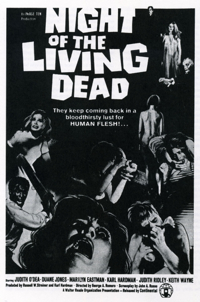How many Zombies are lurking in your sales pipeline?
November 21, 2013

Have you ever felt that you might be in the presence of the living dead? Even if you are not a horror movie fan, it might be worth taking a closer look at your organisation’s sales pipeline. The things you are likely to uncover could disturb you.
That’s because many of today’s sales pipelines contain deals that are destined to never close - and yet the sales people responsible seem strangely unwilling to acknowledge the fact. Many of the deals were never alive in the first place - and many more are beyond any hope of resurrection.
Suspended animation
 It’s no wonder that CSO Insights report that sales forecast accuracy rates have hovered below 50% for years. Sometimes it’s because of a genuine change in circumstance on the part of the prospect. But more often than not, the unclosed opportunity was already dead - or at least it was in a state of suspended animation.
It’s no wonder that CSO Insights report that sales forecast accuracy rates have hovered below 50% for years. Sometimes it’s because of a genuine change in circumstance on the part of the prospect. But more often than not, the unclosed opportunity was already dead - or at least it was in a state of suspended animation.
I can remember joking about it years ago when I was a sales leader myself. You’d see sales people put the same deals up every month as certainties for closure. The opportunities even came to be known as “the usual suspects”. But somehow, another month went by, and the deal was still stuck there.
Zombies in your midst
Of course, the reasons given for the failure to close changed, and often became progressively more creative and less believable. But these zombie deals remained obstinately stuck in the pipeline until they were forced out - and when that happened it was almost always at the instigation of the sales manager, rather than the sales person.
Now many sales people (although not usually the most successful ones) are by nature optimistic. They may not recognise the equivalent of the rotting flesh on the corpse of their cherished opportunity. So it’s down to their sales management to challenge them, and to recognise the zombies in their midst.
The problem starts earlier
But the problem is rooted much earlier than the failure to exclude late stage deals from the sales forecast. The real problem is that many of those deals should never have consumed serious sales energy in the first place. The opportunities ought to have been qualified out early on, before so much effort had been invested in them.
Because, in an awful lot of cases, good deals don’t turn into zombies. Many of the un-closable opportunities started off as zombies in the first place, and then took on a life of their own because they were allowed to. These unsupervised, un-closable deals marched forwards with a momentum of their own.
Avoid forecasting the un-forecastable
Rooting out these zombie deals is a key responsibility for sales leadership at any time, but it’s a particular challenge in the run up to the end of the sales year. You simply can’t afford to waste precious resources trying to close the unclose-able - and you can’t afford to forecast the un-forecastable.
Take a really close look at your sales pipeline. Pay particular attention to deals that have been stuck at the same stage for an unnatural period of time, or where they have been repeatedly forecasted in prior periods.
Where's the evidence?
Be rigorous. Where’s the evidence that the need is real and urgent? Where’s the evidence that they will do anything? Where’s the evidence that they will select you? Where’s the evidence that they will do something now, rather wait until later? And where’s the evidence that the deal is actually worth winning anyway?
If you have any doubt about any of these critical qualifying questions, the sensible approach is to work on the presumption that you are not going to close the deal and remove the opportunity from the forecast. If the sales person disagrees, get them to provide tangible evidence. Place the burden of proof on them.
A smaller, better pipeline
There’s an obvious consequence of taking this robust approach. Your pipeline (and maybe your forecast) will appear a lot smaller. But that’s because many of the deals you’ve just flushed out were never real in the first place.
Set those zombies free. Let them terrorise someone else’s pipeline. Focus your energies on the deals that are really winnable. And then make sure that whatever you then add to the pipeline in the future has a strong beating pulse.
By the way, one of the foundations of building a strong pipeline is having a clear sense of what an ideal prospect looks like - one that every member of the sales and marketing organisation buys in to. You can download a short guide here - I hope you find it useful.


Comments